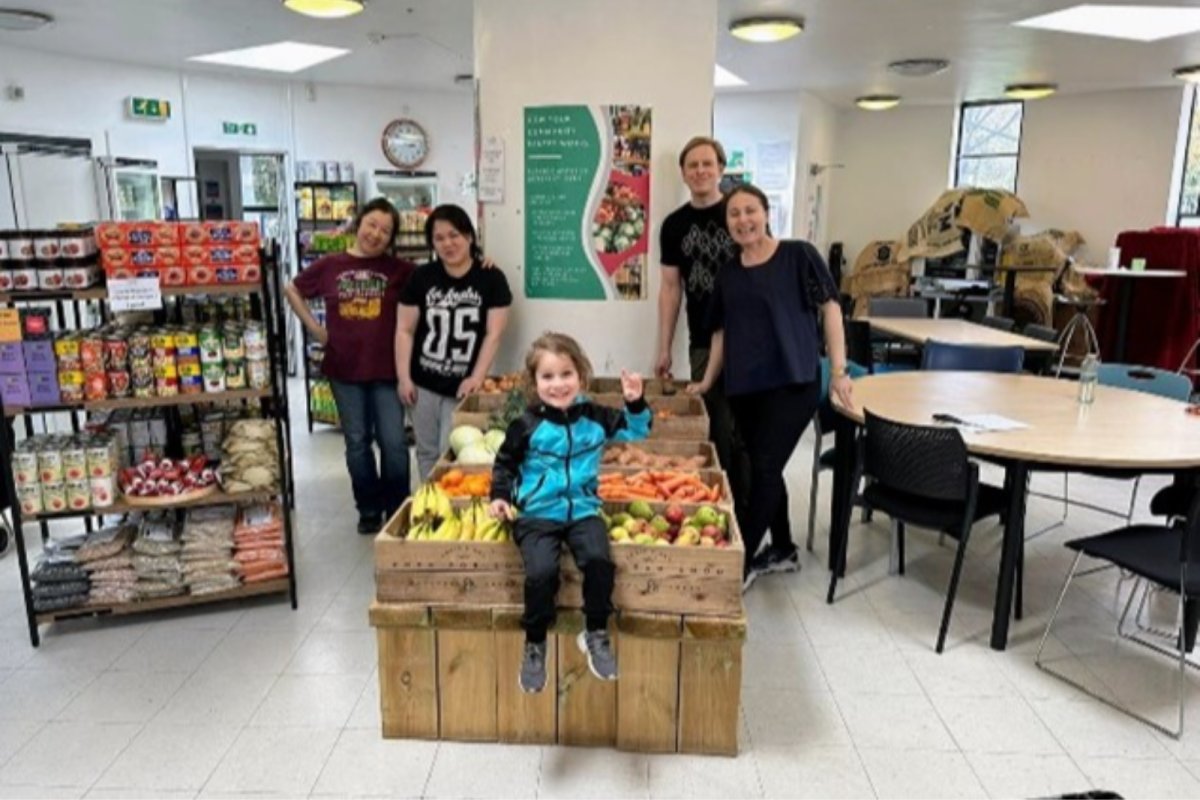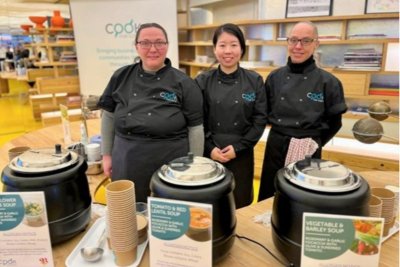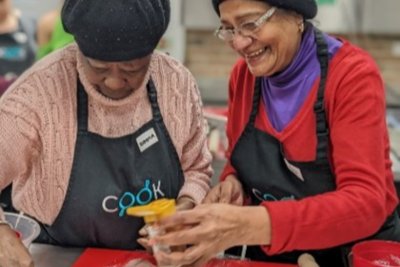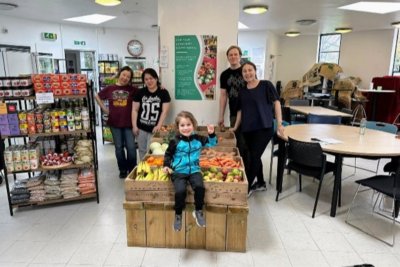 Cook for Good food pantry. Credit: Cook for Good
Cook for Good food pantry. Credit: Cook for Good
Cook for Good

Cook for Good is a hub for local residents based in King’s Cross, offering a programme of free cooking courses and community meals, employability and enterprise projects, and a weekly surplus food pantry.
Since launching in 2019, they have grown to serve approximately 350 households, and to train 30 volunteers. Their business model provides holistic support to the local community through their community kitchen and pantry, and is subsidised through income produced by working with local businesses with social goals.
Cook for Good was founded with a mission: to build confidence, connections and communities through food, in a hyperlocal, hands-on way.
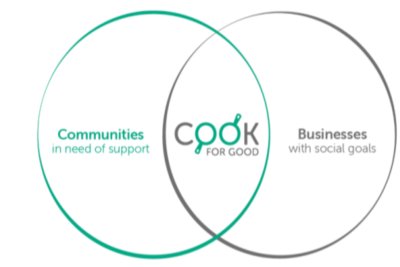
Business model
Cook for Good is a social enterprise, set up as a Community Interest Company (CIC), which works with Peabody Housing Association, local businesses, and the community to tackle food poverty and social isolation and boost employability, on the Peabody Priory Green Estate in King’s Cross. The project is run by ten staff and 24 active volunteers.
The model sets out to bring businesses and communities together through food and cooking, for the benefit of both. The community programme which Cook for Good delivers is largely funded by the profits from corporate teambuilding events, as well as bespoke partnerships with a network of corporate social partners. The pantry and kitchen were developed in partnership with supportive local businesses.
Community programme
In 2021, Cook for Good opened a surplus food pantry for residents, which opens once a week, with both a morning and afternoon slot. The afternoon slot was added to meet high demand and reduce the waiting list, doubling their capacity of members. Customers pay £3.50 to choose a shopping basket of fresh and long-life food with a value of around £20, and enjoy free hot drinks, soup, pastries, and a space to eat and socialise. The Community Coordinator is on hand to offer support, advice and referrals, and they also regularly host drop-ins from specialist advisors in areas such as financial advice, housing support and wellbeing. They work with Help on your Doorstep to support outreach work, and refer people for additional support where appropriate.
Cook for Good run a series of employability programmes, supporting residents to access training and work experience, and creating pathways into work. They offer a 6-month training programme for volunteers, during which they learn skills including catering, front of house and running the pantry. Having completed the programme, volunteers are able to access paid casual work with the organisation, and are supported to find roles in catering and hospitality; they can also remain as volunteers, if they choose.
They have created a Community Brigade programme, which provides skills training, mentoring and work experience for 12 local people, again over a six-month period. The Brigade take part in theory and practical classes in the kitchen, which leads to a Foundation Level Certificate in Food Safety, as well as teaching them some excellent cooking skills. They gain work experience at Cook for Good events, and receive mentoring support from Cook for Good’s CEO to help them with their next steps. The first cohort graduated in the summer of 2023; three of them are exploring setting up their own social enterprises around food and wellbeing; several more are exploring further work experience opportunities outside of the organisation, and others are actively seeking paid employment. A second cohort is due to start in the autumn of 2023.
Members of the Brigade took part in a micro-enterprise pilot called Cook for Good Soup, which saw them using surplus food from the pantry to prepare soup and homemade baked goods, which they then took to sell at lunchtime to local businesses in King’s Cross generating a profit. They carried out market research, seeking customers’ views about their preferences and using this to refine future menus. The pilot was supported by four companies: RS, Phoenix Court, Autotrader and Google, and all proceeds were reinvested into the community programme. The pilot is being rolled out in the autumn of 2023.
The summer of 2022 saw the launch of a hugely popular programme of community cooking classes and demonstrations, which take place in the community kitchen. These include:
- Holiday classes for children
- ‘Three ways with…’ demos to help members get the most out of their Pantry ingredients
- ‘Quick and easy budget cooking’ sessions to support residents increase their confidence and skills to help with cooking on a budget
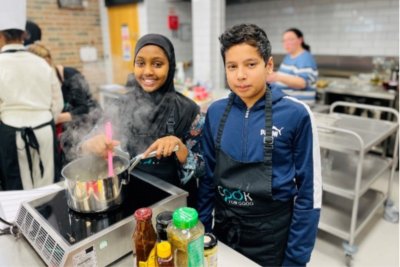
In the summer of 2023, Cook for Good launched two cooking series, targeting specific groups within the community; a Men’s Grub Club, which aims to bring older male residents together for cooking and companionship, and Cook for Health, which is designed to help local people with diabetes tackle their condition through healthy eating.
Cook for Good host monthly free community meals, which bring residents together for food, fun and conversation, to reduce isolation and promote community-togetherness. There is space for around 100 people across two sittings, and guests are encouraged to sit and connect with people they don’t know well. In most cases the food is cooked and served by corporate teams as part of a teambuilding event, or hosted and cooked by the Community Brigade.
Residents sign up for invitations to cooking classes and community meals, and are then emailed when a new event or class is taking place. Potential volunteers and Brigade members go through an interview process before being taken on.
Aside from the specifically targeted classes, all Cook for Good events are designed to be inclusive of the whole Priory Green community. Menus are planned with different cultural dietary requirements in mind, and efforts are made to bring new people in who haven’t attended before.
Impact on the community
Impact measurements from pantry members that filled in surveys in 2022-23 indicate that:
- 89% worry less about the price of their food shop
- 87% feel they have more opportunities to socialise
- 94% feel more connected to the local community
- 91% feel they are able to make healthier choices in their eating habits
- 89% feel more confident about trying different recipes and new ways of cooking
Food supply and logistics
The surplus food supply for the pantry is mainly provided free of charge by the Felix Project and Food Bank Aid. A substantial proportion of the food provided is fresh fruit and vegetables, which is in high demand from pantry members. Non-perishable food and other household essentials are also provided. The pantry offers a ‘free-from’ range, and is careful to offer options such as vegetarian, vegan and halal.
These suppliers are highly reliable and there is usually enough stock to meet demand, with the Pantry Manager occasionally needing to top up the fresh produce. Supplies are delivered by the two providers each Wednesday ready for Thursday’s pantry, and are stored within the Pantry space.
Other, smaller organisations such as Carnevale provide tinned goods, and a nearby Nandos has recently started providing 15 kilograms of chicken pieces once a month. A local bakery, The Flour Station, provide bread and pastries for pantry members to enjoy with a cup of soup, tea or coffee once they have done their shop. And ready meals, cooked at corporate team building sessions, are also made available to Pantry members.
The Pantry team monitor the number of service users on a weekly basis using a computerised system, and monitor their stock manually.
Cook for Good is registered with Islington Council, who awarded both the kitchen and pantry a five star rating following their 2023 inspection. They have a robust food safety management system in place which requires them to keep diary records for food production, service, cleaning and staff training.
Funding and opportunities for social investment
Cook for Good was set up as a CIC. It operates on the Peabody Priory Green Estate, where it has developed two spaces; the community pantry and kitchen. These spaces previously housed a laundry and café, both of which were derelict and unused for several years until Cook for Good and Peabody joined forces. Peabody has given Cook for Good a rent free and utility free lease of the spaces for 10 years.
With the premises agreed, Cook for Good then partnered with a number of local organisations, including Meta, Ninja and TP Bennet, to transform the two spaces into a bright, modern pantry and a high-spec teaching kitchen. Since then, Cook for Good have increased their network of corporate social partners and funders. These organisations support the work in a variety of ways, from helping make the best of the spaces to sponsoring a specific programme or project.
The teambuilding events which Cook for Good host in the kitchen are a key income stream. These see teams coming to the kitchen to prep, cook and package up high volumes of meals which are shared with residents or other local outreach organisations. The events are highly popular with the clients who take part, and currently over 50% are repeat bookings.
In 2022-23 these events generated over £150,000 in revenue, which was invested into the community programme, as well as producing over 4,000 meals for local people. This revenue also subsidises both staffing costs and the running costs for the pantry and kitchen.
Together, the teambuilding events and corporate partnerships deliver a sustainable source of revenue, which represents around 70% of Cook for Good’s income. In addition, the organisation receives some grant funding to test and deliver new programme models. They host four supper clubs a year, welcoming 50 guests for an intimate evening including a cooking demo, a three-course meal and a Q and A session, to raise additional funds.
“Such an amazing way to spend a day and with a purpose, one of the best events I have done and will be doing again in the future; the team are incredible, and you can see the level of passion they have in what they are doing. I’ve been coming into London for over 25 years and like many commuters never really think about the community around us, it’s made me reassess in how we should be more involved in what is around us and how we can make more of a positive impact with the community.” Neil Thomas, Nuix
Challenges
After two years of trading, the organisation is running smoothly, with regular, positive feedback from both corporate clients and community members.
On the corporate side, the biggest day-to-day challenge is getting out the message that Cook for Good is the place to spend teambuilding revenue and deliver social impact, with no external marketing budget. On the community side, it is ensuring that the organisation meets the needs of a complex community, through ever more difficult and challenging times, not just by tackling food poverty and insecurity but also by addressing the root causes of these issues and improving lives in a sustainable way
The other main challenge, given that Cook for Good only has one kitchen, is maintaining a balance between using the space to generate revenue through corporate team events, and making it available to the community for cooking classes and courses.
Future plans and aspirations
The Cook for Good leadership team continue to be ambitious, with their core aims for 2023-24 (some of which are already in the pipeline) being:
- Achieve ambitious income targets through 90 high-quality teambuilding events and four sold-out Supper Clubs.
- Broaden the community programme to include a second Community Brigade cohort, an expanded calendar of community meals, cooking classes and demos, and an expansion of the Cook for Good Soup pilot.
- Deepen community reach and impact through increased membership and usage of the Pantry and more varied attendees at meals and classes.
- Develop the volunteer programme to enhance community connections, build skills and confidence, provide work experience at events and within local hospitality firms and, ultimately, create pathways into paid work.
Leaders are exploring pathways for further growth, and assessing whether setting up a franchise model, or supporting other orgs to set up similar models in their own communities, could be relevant routes which would deliver further social impact.
Top tips for others starting or running similar enterprises
Karen Mattison, Co-Founder and CEO, has shared the following advice and recommendations:
“The hardest part of setting up something new is the beginning, when you are pushing against closed doors. It’s easy to get downhearted, so you need to be crystal clear about what you want to achieve, and pursue it relentlessly. Be prepared for knockbacks, and be open to things that you haven’t thought of yourself, and willing to divert your path if a great opportunity comes your way.
“On a personal level, you may find it easier to begin your new project as a side hustle alongside your day job, until you feel confident enough to throw yourself fully into it. And then when the time is right, just go for it.”
Here are some other pointers from the Cook for Good team:
- Do your research. Reach out to other organisations in similar spaces and get their advice. For example, we were planning to open a foodbank, but were introduced to the idea of a pantry by The Felix Project. There’s always a lot to learn from others – but that doesn’t mean you have to follow a cookie cutter model.
- Get input from the community you’re looking to serve. A local outreach organisation, Help on your Doorstep, helped us connect with the Priory Green Estate community and get their thoughts and ideas about what we were proposing, which helped ensure that our offer was really adding value.
- Involve the community as much as possible, so they feel that they are part of the solution. For example, we don’t offer volunteering opportunities to corporates, but instead recruit community members to take part in a volunteer programme which is giving them valuable work experience and skills.
Good Food Enterprise: Working to provide food that is good for people and the planet, and support local production playing a part in community beyond trading.
Sustain
The Green House
244-254 Cambridge Heath Road
London E2 9DA
020 3559 6777
sustain@sustainweb.org
Sustain advocates food and agriculture policies and practices that enhance the health and welfare of people and animals, improve the working and living environment, promote equity and enrich society and culture.
© Sustain 2024
Registered charity (no. 1018643)
Data privacy & cookies
